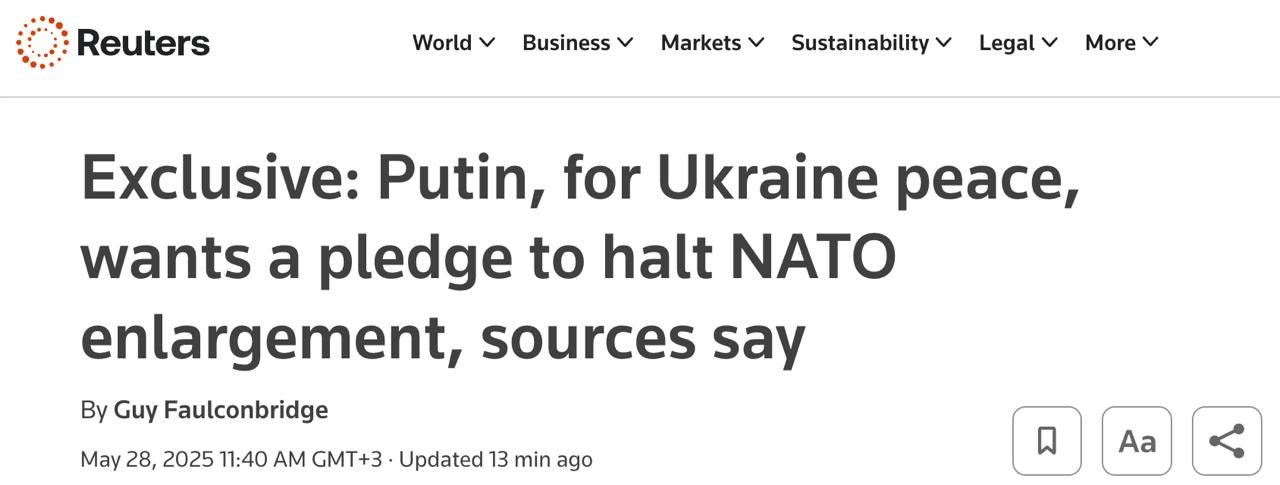nortex97 said:
An interesting piece, written from a pro-war euro perspective, though written by a Chinese guy for a Turkish paper I think.Quote:
After the Istanbul talks, Putin inspected the fully recaptured Kursk region and will soon visit Donbas, controlled by Russian forces. This over three-year war has now entered a new stalemate phase marked by a temporary Russian victory. With overwhelming military strength and vast occupied territory, Russia refuses Ukraine's call for a ceasefire before negotiations and instead favors negotiating while fighting. This strategy prevents Ukraine from regrouping and aims to drive Ukrainian forces out of the remaining contested areas, securing full control of the four regions. The "border buffer zone" Putin spoke of essentially represents a redefined Russia-Ukraine boundary, securing complete victory in the war.
Russia holds battlefield initiative and strategic upper hand, Ukraine refuses to yield, and European countries are unwilling to abandon Ukraine. This complex situation has gradually drained the Trump administration's confidence, patience, and courage, increasingly signaling a hands-off approach.Quote:
The Trump administration is gradually abandoning leadership of the Western world and relinquishing its dominant position in NATO. Its focus on making America strong alone means it will never bleed to preserve Ukraine's sovereignty and territorial integrity or help Europe fulfill its strategic dream of containing Russia. Although the Russia-Ukraine war has entered a new phase of direct negotiations, there is no chance for a win-win outcome. Ukraine and Europe's best hope at present is to maintain the status quo and wait for the Republican administration to step down, hoping that a Democratic administration will return to the previous hardline policies. Even so, Ukraine and Europe are unlikely to win the warunless a dramatic internal change occurs in Russia, or the country disintegrates. A united, nationalist Russia remains undefeated, especially not on its own doorstep.
History has long witnessed the power struggles between Russia and Europe. It shows that Russia has never willingly returned land it has occupied or annexed unless it was truly defeatedespecially not places like Crimea or the four eastern and southern Ukrainian provinces, which are historically connected and home to many generations of ethnic Russians.
Three years ago, shortly after the Russia-Ukraine war broke out, the author predicted that this century's war would end with a tragic Russian victory and a disastrous Ukrainian defeat. The forecast was that this continental war involving multiple actors would first become "Afghanistan-ized," and eventually "Palestinian-ized." Unfortunately, reality is step by step confirming this prediction.🇺🇸🇵🇱US withdraws military personnel from Poland's Ukraine aid hub
— harici (@haricinews) April 9, 2025
📌 Polish Prime Minister Tusk said this does not mean a reduction of US forces in Poland or Europe
🇺🇦 Facilitation of military assistance to Ukraine through Jasionka base will now continue under Polish and NATO… pic.twitter.com/XCDlgAz8xR
The tragedy of Nato Expansion.Quote:
Worse still, NATO expansion became untethered from strategic necessity. It took on a life of its own an institutional momentum powered by bureaucracy, domestic politics, and ideological conviction. At every step whether in Poland, the Baltics, Georgia, or Ukraine Western policymakers failed to ask the most basic question of all: how will this look from Moscow? And can we live with the reaction?
We believed, or convinced ourselves, that history had ended. That power politics had been transcended. That Russia would simply accept its diminished role in a world reshaped by liberal rules, norms and institutions. But history didn't end. It reasserted itself brutally, predictably, and with tragic consequences.
Let's be clear: Putin's war is a war of choice. It's rooted in a revanchist vision of empire and an authoritarian contempt for Ukraine's independence. But acknowledging that doesn't absolve the West of its role in laying the foundations for conflict. To do so would be to confuse moral judgment with strategic clarity. It would be, in essence, to choose self-congratulation over self-awareness.Correct on all points. Long pieces, more at the links.Quote:
The Tragedy of NATO Expansion
The tragedy of NATO expansion is not that it happened. It's how it happened mechanically, arrogantly, and with little regard for the balance-of-power dynamics that have shaped geopolitics since Thucydides.
We had a fleeting chance to build something better. We didn't. And now we live in the world that that decision helped shape.
The bear is growling. And we're pretending we don't know why.
This argument has always been unserious. I can counter all of that by saying what if NATO had not expanded? How many of the Baltics and other border countries would have already been absorbed by Russia? Russia never willingly retreats and advances whenever there is an opportunity. Ask the Japanese about the Kurils.

